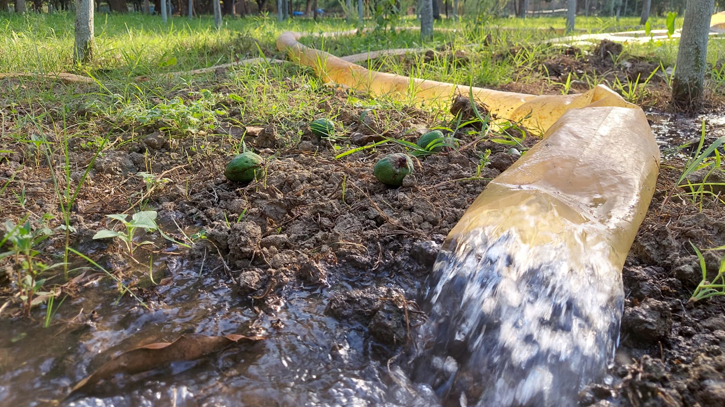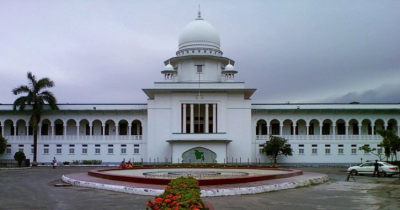
Photo : Messenger
The yield of mango and litchi has been adversely affected due to the ongoing heatwave across the country. Bangladesh Meteorological Department says the hot temperature will not reduce in two to four days. As a result, as the number of days of scorching heat will increase, the yield of mango and litchi will decrease accordingly. Traders fear that mango yield will decrease by at least 50 to 60 per cent this time. Almost the same is the case with litchi.
Stakeholders say this year, for the first time, climate change has affected the country's mango and litchi production. They cited two main reasons behind this. One of the reasons is that because of climate change, winter has ended late this time. Then it rained when the trees were full of buds. Due to this rain, the buds have fallen. The second reason is that after the unseasonal rains, scorching heat and drought have started. Due to this, small mangoes are falling from the trees.
Mango traders add another reason to these two for the decline in mango production. The reason is that this year was off-season. Due to these reasons, there are worries among orchard owners and mango farmers. Still, they are working hard to protect the buds. They are doing various types of maintenance, including spraying pesticides and removing weeds.
According to the information of the Department of Agricultural Extension (DAE), 25 lakh tonnes of mangoes were produced in 2023, of which 1,600 tonnes were exported. This year also, there is an expectation of 25 lakh tonnes of mango production target. But traders say this year mango production will be 50-60 per cent less.
Director General of DAE Badal Chandra Biswas said, “Besides producing mangoes, we are working to produce quality mangoes. For this, improved agricultural practices are being followed.”
Mehedi Masud, director of the year-round fruit production project of the DAE, told The Daily Messenger that the production of mango and litchi will be less this year. “Low production of mango and litchi will increase the price. As a result, mango farmers will not suffer much loss.”
Mohammad Arifur Rahman, director of exportable mango production project, said that mango production is decreasing due to severe drought and unseasonal rain. As a result, the production of Fazli, Himsagar, and Gopalbhog mangoes will decrease. He thinks that the price of mangoes may increase due to low production.
Rafiqul Islam has been growing mangoes in Rajshahi for 20 years. He told The Daily Messenger that there are 3,000 trees in his gardens. “Last year, the trees that produced 10 maunds of mangoes may produce a maximum of 2 maunds this year. Not more than that. The weather conditions will reduce mango production by 60 per cent compared to last year.”
When asked why mango production is decreasing, he said almost all the gardens in Rajshahi were full of mango buds. “Then it rained in March. All the mango buds have fallen. Now due to the intense heat, the mango pods are falling. They cannot be saved even with water.”
Abdur Razzak, a mango grower in the same area, said that the trees produced massive mangoes last year but farmers have to worry at the beginning of the season as the buds are less on the trees this year.
Fruit Research Centre Chief Scientific Officer Dr Shafiqul Islam said that there was a bumper yield of mangoes in Rajshahi last year. “A characteristic of mangoes is bumper yield in one year and fewer buds in the next year.”
He said that after the trees produce a lot of mangoes, the next year the trees store less food. “Fewer buds have appeared on the tree due to less accumulation of food. Leaves have come to the trees for less buds.”
According to the information of the Department of Agricultural Extension, mangoes are being produced this year in a total of 19,602 hectares of land in nine upazilas of Rajshahi. Among them, the largest mango production is in Bagha upazila on 8,570 hectares of land. In this upazila, the rate of mango budding is the lowest, 50 per cent.
Kamran, a mango trader in Chapainawabganj, told The Daily Messenger that 70 percent of the buds have fallen due to rains in March. Now again due to severe drought, the mangoes are falling because the water layer is going down and they cannot give water.
Chapainawabganj is expected to produce 300,000 tons of mangoes this year and 20 to 25 percent of mangoes can be produced there, he said. The worst damage to this garden is Langra mango. Then khirsa mango also got damaged. Despite watering some trees in the drought that lasted throughout the month of April, the mangoes are falling due to the heat of the water.
Mamun, the owner of litchi garden, said that at the beginning of this year, there were few buds on the trees. Currently litchi has grown from bud to fruit. Due to the intense heat of the sun, the litchi has grown less in size, and the litchi is falling from the tree to the ground. There is no benefit even with water.
Another litchi farmer Billal said, 40 of my 70 litchi trees have produced fruit. Half the trees did not bear fruit. Then now the litchi is drying in the heat of the sun. Falling again. This year the fruit will be very less.
Samsul Alam, agriculturist, training officer of Meherpur district agriculture extension department said, due to intense heat for the last two weeks, mango pulp is falling off. The agriculture department is advising the farmers. Gardens where mango and litchi pods are falling.
Messenger/Fameema








